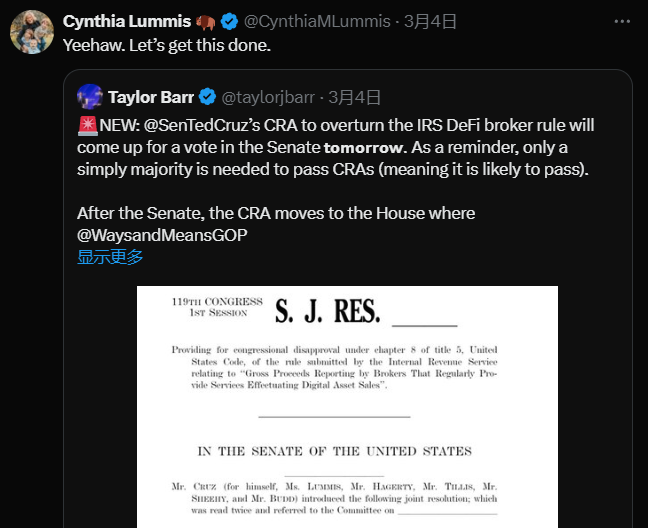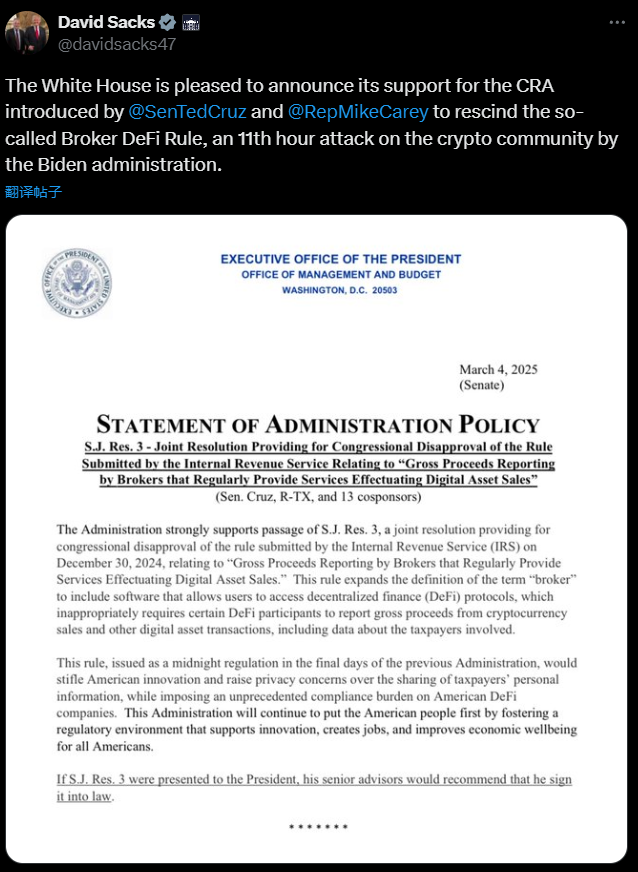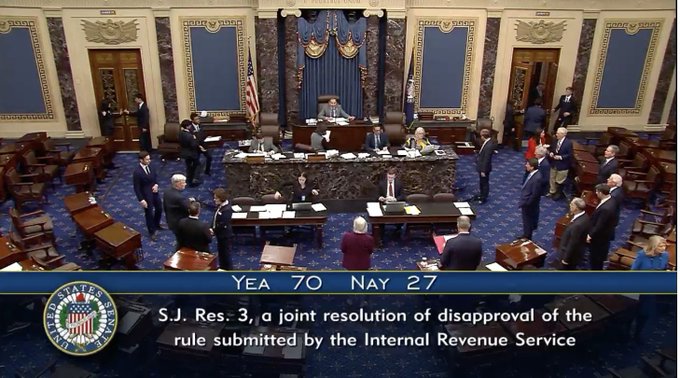As the cherry blossoms in Washington are just beginning to bloom, under the dome of the Capitol Rotunda, a dramatic twist has emerged in the four-year regulatory tug-of-war. On March 5, 2025, with a lopsided vote of 70:27 on the Senate's electronic scoreboard, the "Broker Extension Rule" that attempted to shackle DeFi with traditional financial regulations was officially overturned. This vote not only rewrites the trajectory of the crypto industry, but also reflects the profound collision between digital civilization and the institutional framework of the industrial age.
The Dawn of Undercurrents
In the Wyoming State Capitol building, where the morning mist has not yet dissipated, Senator Cynthia Lummis is gazing at the fluctuating crypto market on her phone screen. This former rancher-turned-legislator, however, has her thoughts drifting to Washington, D.C. - in three hours, the Senate will vote on the "Congressional Review Act" resolution she co-sponsored with Ted Cruz. Scrolling through the Twitter interface, she retweeted a post supporting the repeal of DeFi regulation, adding the comment: "Yeehaw. Let's get this done."

The undercurrents of this morning had already begun to stir back in the scorching August of 2021. When the "Infrastructure Investment and Jobs Act" was passed in the Senate with a 69-vote majority, hardly anyone noticed the hidden Section 80603. This provision, later dubbed the "crypto industry Trojan horse," defined "digital asset brokers" as "any entity that facilitates the transfer of digital assets," laying the groundwork for today's regulatory storm.
Three years later, in the depths of winter, the IRS wielded its newly forged regulatory sword to strike at the crypto world. According to the final rules issued in December 2024, starting from January 1, 2025, all platforms involved in digital asset transactions - whether centralized exchanges like Coinbase or DeFi front-end providers like Uniswap - must report the details of each transaction to the IRS using the 1099-DA form. The level of detail required in the form is staggering: from the user's social security number to the digital fingerprint of NFTs, from the records of stablecoin conversions to the precise breakdown of miner fees, as if to stuff every byte of the blockchain into the IRS's filing cabinets.
The Battle Inside and Outside the Courtroom
As soon as the new rules were introduced, the crypto castles of Silicon Valley sounded the alarm of resistance. Michele Korver, the crypto regulatory affairs lead at a16z Crypto, sparked industry-wide resonance with her social media outcry: "This is a declaration of war on the freedom of code!" The top venture capital firm quickly joined forces with the Blockchain Association, the DeFi Education Fund, and other organizations to file a lawsuit in the U.S. District Court for the Western District of Texas. The lawsuit sharply pointed out that the Treasury Department's equating of DeFi front-ends with traditional brokers not only exceeded the authority granted by the Administrative Procedure Act, but also violated the immutable nature of smart contracts.
The off-court battle was equally intense. In a glass-walled skyscraper on K Street in Washington, lobbyists presented lawmakers with staggering data: if the new rules were implemented, just the compliance costs for wallet service providers like MetaMask would be an additional $47 million per year; the total value locked (TVL) of DeFi protocols could plummet 23% in the first year; and up to 81% of developers were considering relocating their projects to more lenient jurisdictions. "Imagine if in the 1990s we had required every website owner to register their visitors' information - what would the internet look like today?" a nameless lobbyist asked during a closed-door meeting.
These voices ultimately struck a chord with lawmakers. During the Senate Banking Committee's secret hearings, staff demonstrated the workings of DeFi protocols to the senators: when Senator Pat Toomey tried to borrow on the Compound platform using a hardware wallet, he was surprised to find that the entire process involved neither customer service nor a corporate entity. "It's like shopping in an automated factory, but having a cashier handwrite an invoice for every item," the veteran Republican later remarked to his aide.
The Crypto Czar also stood with the pro-DeFi camp on behalf of the White House, and was pleased to announce support for the repeal of the so-called Broker DeFi Rule, marking the Biden administration's final assault on the crypto community.

The Revelation of Wyoming
In this nationwide debate, Wyoming shone like a guiding light. As early as 2019, this least populous state in the U.S. enacted the "Digital Asset Framework Act," granting legal personhood to DAOs (Decentralized Autonomous Organizations). Strolling through the blockchain industrial park in the state capital Cheyenne, one can see scenes like this: ranch owners in cowboy hats trading carbon credits through smart contracts, developers in hoodies discussing protocol upgrades with state financial regulators. State Treasury data shows that in 2024, the tax revenue contributed by digital asset companies in Wyoming grew 214% year-on-year, while crypto-related financial crimes decreased by 37% during the same period.
"Regulation is not the enemy, but misguided regulation is." On the PowerPoint slides displayed in the Senate debate, Senator Lummis juxtaposed two photos: one showed a real-time dashboard of a Wyoming ranch using blockchain to track its beef supply chain, the other was an announcement of the dYdX exchange relocating to Bermuda. "The former proves that clear rules can unleash the power of innovation, while the latter warns that heavy-handed regulation will destroy the industry's foundations." Her voice echoed through the Rotunda, "When we demand smart contracts to perform KYC (Know Your Customer), it's like ordering self-driving cars to recite traffic laws - not only absurd, but a fundamental misunderstanding of the technology."
The Weight of 70 Affirmative Votes
On the eve of the vote, the corridors of Capitol Hill were filled with a sense of impending historical significance. Progressive Democrats and Tea Party conservatives, rarely seen in the same room, were scattered with briefing materials prepared by crypto industry lobbyists. The words of a centrist senator captured the sentiment of the majority: "I still worry that DeFi could become a money laundering channel, but I fear more that America will lose this digital finance revolution."

This anxiety was quantified in the voting results: of the 70 affirmative votes, 18 came from lawmakers traditionally conservative on tech policy; among the 27 nays, there were also liberal figures who had previously publicly supported crypto regulation. This voting distribution, cutting across the political spectrum, suggests that the digital currency issue is reshaping the power landscape in Washington.
The passage of the resolution quickly sparked positive reactions in the crypto market, with investors and developers expressing optimism about the industry's prospects. But the deeper transformation was happening in the code world: on the Ethereum core developer forums, threads originally used to discuss compliance solutions were replaced by technical upgrade proposals; a well-known privacy protocol announced tripling its research budget for zero-knowledge proof technology; even the traditional finance giant JPMorgan Chase quietly revised the roadmap of its Onyx digital asset platform.
After the Shackles Are Removed
However, freedom has always been accompanied by responsibility. Amidst the cheers of the Senate vote, Chainalysis' annual report was like a bucket of cold water: in 2024, the amount of illicit funds transferred through DeFi protocols reached $6.8 billion, a 37% increase from the previous year. "This reminds us that the withdrawal of regulation does not mean a free-for-all." Former SEC chairman Jay Clayton warned on CNBC, "The industry must prove the effectiveness of its self-regulatory mechanisms."
This self-discipline is sprouting in unexpected ways. At the global DeFi summit held in Miami, leading protocols jointly released the "Transparency Initiative", promising to monitor large capital flows through on-chain analysis tools; a certain decentralized insurance platform has launched a "compliance pool" that offers lower fees for users who complete identity verification; more notably, in the regulatory sandbox of Wyoming, the first regulatory DAO co-governed by the state financial department, academic institutions, and developers has begun trial operations.
"This may be the regulatory paradigm of the digital age." David Engel, director of the Crypto Policy Lab at Stanford Law School, wrote in his latest paper, "When regulators shift from wielding the big stick as police to becoming participants in protocol governance, and when compliance requirements are realized through smart contracts rather than administrative orders, we have found the golden intersection of technological innovation and public interest."
Conclusion
Four years ago, when the 80603rd clause was quietly written into the bill, no one could have foreseen that it would trigger such a far-reaching technological awakening. Today, the vote in the Senate Chamber not only overturns a regulatory rule, but also marks the beginning of human society's more humble understanding of the blockchain revolution - not to cast the digital civilization in the mold of the industrial age, but to let the system iterate like code, seeking a dynamic balance between order and innovation.
As the resolution is passed to the House of Representatives, the final chapter of the story has yet to be written. But one thing is certain: in the moment when 70 senators pressed the "yes" button, they were not only rewriting the script of DeFi's destiny, but also writing the prologue to a new era: where law and code are not mutually exclusive adversaries, but symbiotic weavers of the digital civilization.






